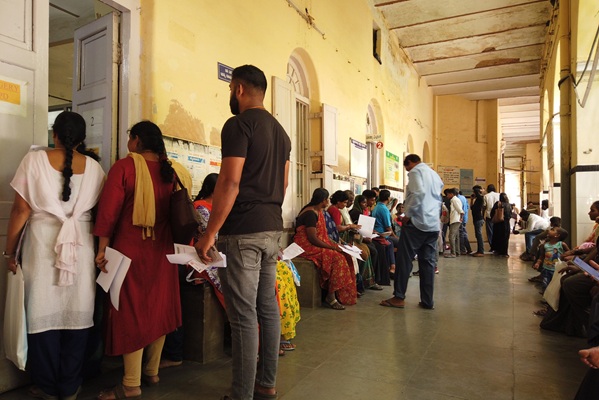.png)
Beyond the Doors: Where Hope and Humanity Endure
In waiting rooms, time slows and hope lingers. Beyond verdicts and diagnoses, they hold shared resilience, quiet courage, and the belief that tomorrow may be better.

September 27, 2025 at 7:57 AM IST
The waiting room is more than just a physical space. It is a mosaic of emotions, a crucible where hope quietly simmers beneath the surface of anxious faces.
Whether outside a courtroom, a doctor’s chamber, or an operating theatre, the waiting room embodies something profoundly human: it is a sanctuary of optimism, a silent keeper of strength you never realised you had, and a reservoir of positivity you desperately need.
For many, it is easy to dismiss the waiting room as a mere pause in the chaos of life’s more significant events. Yet, to the people who occupy these rooms, it is far from ordinary. It symbolises anticipation — anticipation not always wrapped in certainty, but often draped in hope. Hope that the verdict will bring justice, that the birth of a new life will be smooth and healthy, or that a long-fought illness will finally take a turn for the better.
For students sitting outside admissions offices, it’s the hope of a future opportunity and the fear of rejection; for job candidates in interview waiting areas, it is the tension between the possibility of success and the risk of disappointment.
In the quiet hum of fluorescent lights and the shuffle of papers, waiting rooms bear witness to some of life’s most profound moments. They are places where time both stretches and contracts, where seconds drip slowly but carry the weight of entire lifetimes. More than a mere anteroom, these spaces hold the power to soothe frayed nerves or ignite a flicker of courage. They invite us to lean into resilience when everything within urges us to flee.
Familiar Faces & Struggles
If you find yourself in these waiting rooms repeatedly, something subtle but profound shifts. The doctors, nurses, lawyers, and ushers cease to be strangers and become familiar, sometimes even comforting, presences. They might smile at you, their eyes offering empathy rather than pity, acknowledging the invisible burden you carry. They move with practiced efficiency, their short exchanges and small acts of kindness quietly telling you that you are not alone in this.
That repeated presence, however, carries its own cruel reminder: the judgment, the diagnosis, or the verdict you seek remains just out of reach. No matter how many times you return, or how well the people around you come to know you, the outcome waits beyond those doors. This is a harsh truth, sometimes it feels like a slow unraveling, but also a strange kind of blessing. Finding a good doctor, a skilled lawyer, an empathetic interviewer or a just judge is rare, and their care is a priceless anchor in turbulent waters.
Many hospitals and court complexes have prayer rooms—quiet sanctuaries where people pray for healing, justice, or some form of resolution. We raise our hopes there, asking for good health or a fair judgment. But buried in those prayers is often a wish deeper still—that we never have to come back. That we are spared the weary cycle of long, listless visits and relentless appointments, where treatment or legal battles stretch endlessly, testing patience and spirit alike. It’s a fragile hope to be treated fairly yet swiftly, without the greed of drawn-out processes or impersonal bureaucracy that too often plague such journeys.
Wheelchairs glide in and out, carrying hopes and fears alike. Doctors in blue scrubs or striped ties with crisp shirts exchange looks that flicker between reassurance and uncertainty. Nurses move quietly like steady guides, while clerks and ushers help keep the restless crowd organised, making the endless waiting more bearable. Together, they form a human tapestry woven with empathy, professionalism, and a shared understanding of what it means to wait in limbo.
Outside, the relentless monsoon rain thrashes against the windows—a fitting metaphor for the hardship and unpredictability of life. Yet, like the steady footsteps that wade through the downpour, those waiting press onward. The discomfort of the world outside is overshadowed by the hope that something better lies within.
Gritty Lifeline
The judgment finally comes in many forms. Sometimes it’s buried in hundreds or thousands of pages of legal text, heavy with implications that shape futures. Other times, it’s a simple prescription handed across a counter, an offer letter handed to a candidate, a marks sheet to a student - all of which carry immense weight. The waiting room stands testament to patience and resilience, holding a cocktail of emotions: anxiety, trepidation, and, crucially, a deep well of hope.
This hope belongs equally to patients as to caregivers, litigants as to beneficiaries, to students and career seekers, it’s a silent bond that links every person waiting in that room. The shared experience of vulnerability, waiting, and wanting engenders a unity that transcends the strangers seated side by side. It is something fundamentally human and profoundly necessary.
Spiritually, these moments often feel karmic—sometimes a destiny unfolding as ordained, sometimes the consequence of choices made, each story righteous in its own way. The justice sought here is not always the black-and-white delivered by courts or hospital reports; often, it is a subtler balance held in the universe’s hands.
Despite the long hours, the uncertainty, and the fear, self-doubt has little refuge here. To surrender to despair would mean to lose the thread that keeps one tethered to life’s possibilities. It is harder than any judgment or diagnosis, because it means giving up on the potential for change, on the belief that today can be better than yesterday, and that tomorrow holds promise beyond today.
The waiting room, with all its quiet whispers and restless pacing, is a place that silently insists the story isn’t over. It calls on us to hold on —to hope, to believe, and to find strength not only within but in the shared burden carried by those around us. In that space between what has been and what will be, the human spirit quietly but powerfully declares: the best is still ahead.



